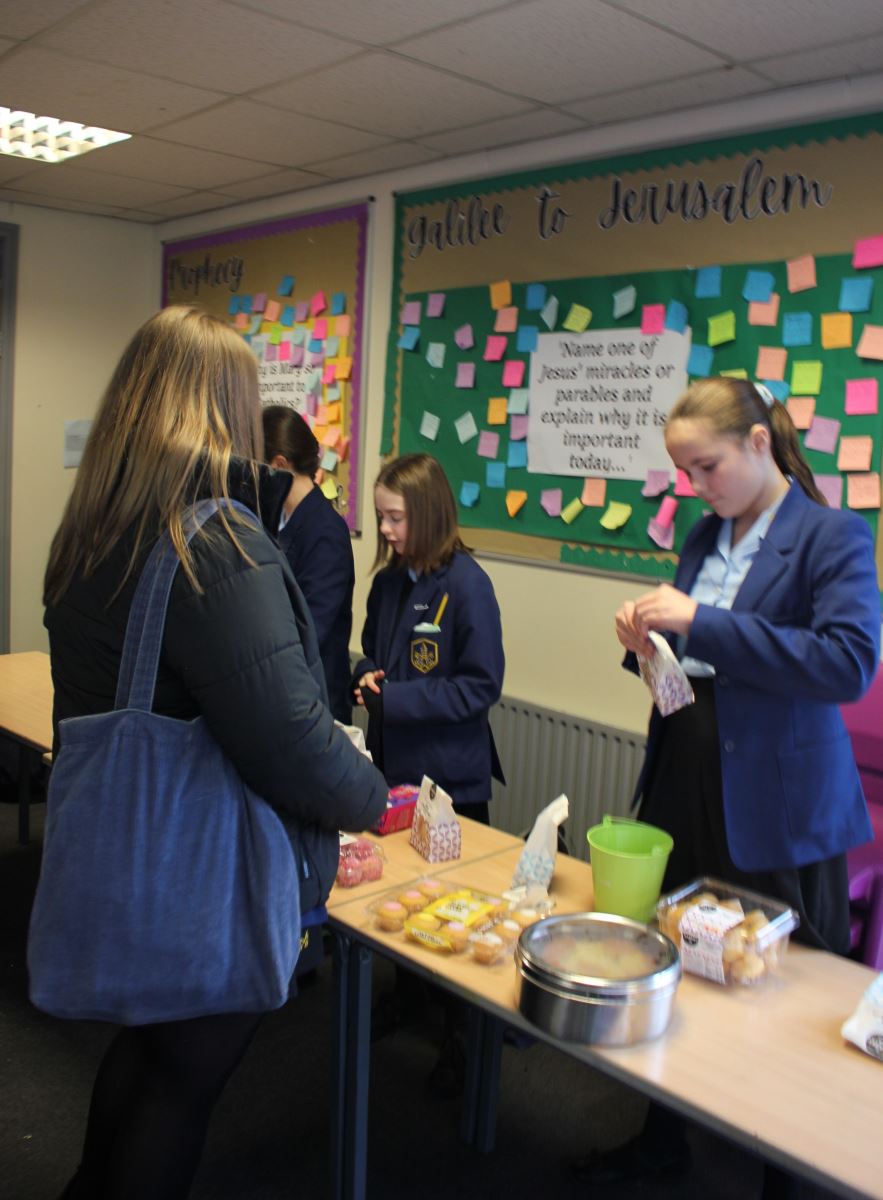Religious Education
Contact
|
Mrs Johnstone |
Associate Assistant Headteacher / Whole School Lead for RE / Prayer and Liturgy |
|
Miss Boswell |
Teacher of Religious Education |
|
Miss Hanrahan |
Head of Religious Education |
|
Mrs Roberts |
Teacher of Religious Education/ Careers Coordinator CEIAG |
|
Mrs Cody |
Teacher of Religious Education (Maternity leave) |
|
Miss Frost |
Teacher of Religious Education |
|
Miss Irlam |
Teacher of Religious Education (Maternity cover) |

Curriculum Intent
Treat each child as a child of God and work to improve their knowledge and understanding of His world and their place within it.
Ensure that young people learn about and from the faith of our school and other world faiths.
Build upon previous learning and experiences to develop our young people’s knowledge and understanding of religion and its place in the wider world.
Ensure that young people are examination ready at GCSE level to secure the qualifications necessary to embrace the next stage in their lives.
Challenge misconceptions, intolerance, prejudice and discrimination on the grounds of gender, race, creed, sexual orientation and/or disability as per the Equality Act 2010 ensuring that ALL are recognised as part of God’s creation thereby encouraging them to challenge these intolerances in our society.
.png)
Department values
“Religious Education… must be regarded as an academic discipline with the same systematic demands and the same rigour as other disciplines. It must present the Christian message … with the same seriousness and the same depth … and should not simply be regarded as one subject among many, but should be the key element in an inter-disciplinary dialogue.”
Key Stage 3 curriculum;
Our Key Stage 3 programme is built around a spiral curriculum shaped by the new Catholic Religious Education Directory (RED). The curriculum is organised into six key branches: Creation and Covenant, Prophecy and Promise, From Desert to Garden, From Galilee to Jerusalem, To the Ends of the Earth, and Dialogue & Encounter. Each year, students revisit these branches, adding new “leaves” of understanding as they build on prior learning and explore fresh questions within each theme.
Key Stage 4 curriculum;
In Years 10 and 11, students work towards the Eduqas Route B GCSE in Catholic Christianity with Judaism. This course helps them explore key beliefs, practices, and ethical questions from both faiths, alongside other worldviews. At the end of the course, students sit three exam papers where they show their ability to define, describe, explain, and evaluate ideas. These papers cover three main areas:
Component 1: Foundational Catholic Theology -37.5% (1 ½ hour exam on Theme 1 and 2)
Component 2: Applied Catholic Theology - 37.5% (1 ½ hour exam on Theme 3 and 4)
Component 3: A study of a World Faith - Judaism - 25% (1 hour exam on Beliefs and Practices)
Curriculum Maps
Year 7
Year 8
Year 9
Year 10
Year 11
SVP
Our Saint Vincent de Paul group is a volunteer-based organisation dedicated to serving those in need within our local community. Guided by compassion and faith, we provide practical assistance such as food, clothing, household items, and raise money to help support individuals and families in our school community facing hardship. Beyond material help, we offer friendship, support, treating everyone with dignity and respect. Our mission is to bring hope and relief to those struggling, fostering a stronger, more caring community for all.
"Opening up opportunities to bring Christ to our lives." - Anji
"I like participating and planning the events" - Lydia
"You are able to help the local community" - Elsie and Jess
"SVP creates a sense of community within the school" - Jess
.JPG)
(1).jpg)

Room Names
In the Bible, roads are more than physical paths—they symbolize spiritual journeys, transformation, and encounters with God. Roads connect people, places, and divine purposes. Whether leading toward conversion, mission, suffering, or revelation, roads represent movement both outward and inward. For Catholics, these paths often mirror the believer’s journey toward Christ, calling for repentance, discipleship, and deeper understanding of God’s will.
.JPG)



